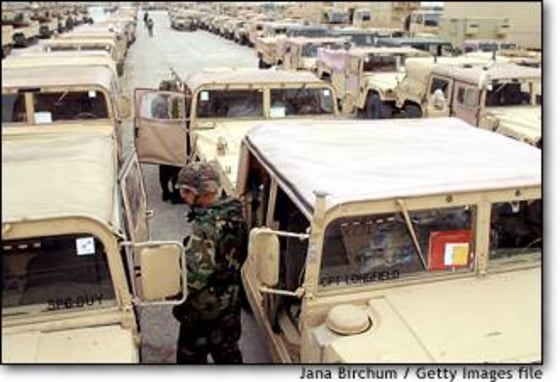American commanders, absorbing the blow dealt by Turkey’s parliament to their plans to open a northern front against Iraq, are scrambling to juggle soldiers, materiel and timetables in a way that will minimize the loss of the Turkish option. Even as U.S. diplomats hold out hope that Turkey may reconsider, other options are being studied, including a plan to truck equipment from Turkey and unite it with American troops flown into captured airfields in northern Iraq.
It is not an understatement to say that an inability to attack Iraq from the north poses extremely difficult problems for the American military.
Gen. Tommy Franks, commander of U.S. Central Command, had hoped to place up to 62,000 American soldiers in Turkey. This force — the 4th Mechanized Infantry Division out of Fort Hood, Texas — and much of its weaponry now languish on ships in the Mediterranean, awaiting orders for deployment elsewhere in the region, or a change of heart in Ankara.
The loss of this option is not merely a speed bump. If the 4th Infantry can’t stage out of Turkey, Central Command will be tempted to land it in Kuwait. But that would take weeks, and weeks may not be available.
Meanwhile, other units on the move also are affected. The 1st Cavalry Division, in the process of leaving Fort Hood, also was earmarked for Turkey. The the 2nd Armored Cavalry Regiment and the 1st Armored Division in Germany would have been able to mass in Turkey and sweep south to rapidly isolate Tikrit, Saddam Hussein’s hometown, and Mosul, a strategic city amid the northern oil fields. All this is off, at least for now.
CROWDING IN KUWAIT
Kuwait already is awash in American troops readying for an attack, and their current numbers already provide a tempting target if Iraq chooses to use chemical weapons in a pre-emptive strike. Indeed, short-range surface-to-surface missiles were spotted in southern Iraq as recently as a few days ago. Landing another three divisions in Kuwait will only make the crowding worse.
Moreover, trying to seize northern objectives from Kuwait, 500 miles to the south, will sacrifice surprise, expose U.S. troops to dangerous flanking maneuvers and waste time. Air-landing these soldiers is a better option, but they will be without necessary heavy equipment and support until their logistical tail catches up. So, the latest bit of news from Turkey is very bad, indeed.
A COMPROMISE
There are a few options, however, that may ameliorate this situation. One involves a compromise with Turkey, which may be persuaded to permit a relatively small number of Americans, perhaps a few thousand, to bring tanks, armored personnel carriers, trucks and other equipment of the 4th Infantry Division to sites in southeastern Turkey. The large majority of the soldiers could be brought to European airfields, perhaps in Italy, or even to Turkey, from where they would be air lifted to forward fields in northern Iraq to meet their equipment convoyed from Turkey.
The difficulty with this course of action is that the 4th Infantry Division will lose control of vital equipment that can’t be properly maintained while it is in Turkey. Trying to unite men and materiel on the battlefield is, at best, very tricky. And where do you put the 1st Armored, 1st Cavalry and 2nd Armored Cavalry Regiment.
NEIGHBORING COUNTRIES
Another possibility is the use of countries that are contiguous to Iraq. The United States has an excellent relationship with Jordan, whose northeastern border is close to areas of Iraq that housed mobile Scud missile launchers in the last war.
The Saudis already have said we can’t use their territory for ground tactical operations. U.S. commanders hope that policy may be up for review, however, as it dawns on the Saudis that war is imminent.
Still, it is difficult to envision how, at the 11th hour, the United States will be able to persuade either of these countries to publicly sanction such a scenario unless the U.N. Security Council authorizes the use of force. Moving troops into Jordan or Saudi via secret agreement is possible, but no one would be fooled. Already, a small number of special operations forces have deployed to Jordan and the truck traffic associated with their arrival immediately showed up in the world’s media.
(NBC News Military Analyst Jack Jacobs is a retired U.S. Army colonel, a Vietnam veteran and recipient of the Congressional Medal of Honor.)
